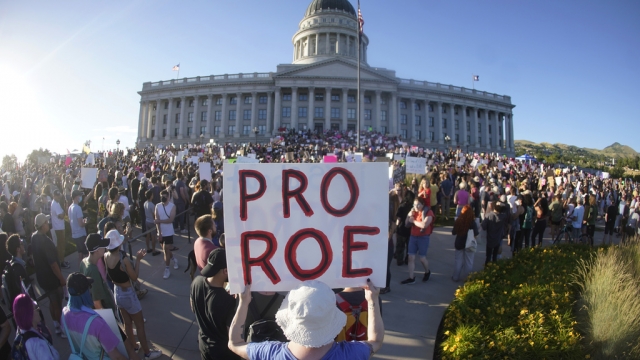"I didn't have any plans to get an abortion," said Jessy Salas, who is non-binary.
Salas was 12 years old when they were first raped by a man a decade older than them. It was New Year's Eve, and the man was babysitting Jessy while Jessy's mother went out.
"I said, 'Well, I don't want to have sex with someone that I'm not married to.' And he said, 'Well, I'll marry you.' And I was like, 'Oh, like, a 12-year-old.' I was like, 'Oh, well, okay. I guess so then,'" Salas said.
Just two years later, they got pregnant by the same man.
Growing up in a rural town, abortion was not even a thought. It wasn't until a trusted female figure painted a picture of Salas' future with a child that abortion became the choice.
"I was a child, a child, having compassion on another child, to not subject them to the pain and suffering that I had had my entire existence," Salas said. "I didn't have a choice to be in that situation, but I did have the choice whether or not to save another life from that kind of abuse and poverty and possibly even worse."
If this happened today, they may still be able to obtain an abortion under Utah law, but conservatives in the state are seeking to make it much more complicated.
A handful of laws set to go into effect Wednesday are now being held up in court — chief among them, a law requiring hospitals to become the only places abortions can be provided.
Right now, the Guttmacher Institute says about 1% of abortions are done in hospitals. The law would have effectively shuttered both independent clinics and Planned Parenthood's abortion capabilities.
SEE MORE: North Dakota passes law banning nearly all abortions
In court last week, lawyers for the state argued that the clinics wouldn't have to shut down if they become hospital compliant, a rigorous process.
Planned Parenthood told Scripps News it's not necessary or possible.
"A hospital is an inpatient health care facility. It has beds for extended inpatient stays, it has hospital theaters for open heart surgery," said Hannah Swanson, an attorney for Planned Parenthood. "Abortion requires none of those things."
If enacted, the law also changes what is legally allowed as a reason for an abortion after 18 weeks. A woman can no longer use rape or incest as a reason, nor could she use a fetal anomaly. The baby's diagnosis must be lethal or put them in a mentally vegetative state, meaning it doesn't include Down syndrome, Spina bifida or cerebral palsy.
Republican Utah State Rep. Kera Birkeland supported the bill. She had her own scares when pregnant and now has a healthy 16-year-old daughter. In the event an abortion needs to be performed, she says hospitals are the only place they should occur.
"If it's going to happen, we want to make sure that it's happening in a safe, reliable place," Birkeland said. "We feel like hospitals and those primary care providers there are going to be better at the follow-up care."
But Dr. Christie Porter, an OBGYN, says hospitals are no safer than abortion clinics. In fact, many of the doctors at these clinics have hospital privileges. Porter also says the law will burden an already burdened system.
"It's not emergency care," she said. "They're gonna show up to the emergency room for non-emergency care. Then you're at the mercy of the OBGYN on call. If they don't want to perform it, then you're gonna have an ER bill for a hospital stay that you're gonna have to pay for, and you're not gonna get the service you want."
Despite a majority in Utah favoring rather strict restrictions on abortion, the rest of the population is fairly nuanced.
SEE MORE: Supreme Court preserves access to abortion pill mifepristone
A Deseret News Poll shows nearly 1 in five say abortion should be legal in all cases, and 12% say it should be legal in the first trimester. And 14% say it should be legal all the way up to viability. In total, 44% of people in Utah support at least some access to abortion.
"It shouldn't be someone in legislature or in Congress deeming what is appropriate medical care for her," Porter said. "What happens in these four walls should stay in these four walls, between a woman and her physician."
Porter is concerned the quality of doctors in Utah will diminish, as OBGYNs won't want to practice or study in a state where they can't learn all aspects of their specialty.
A separate law authored by Birkeland also goes into effect Wednesday. It requires women to report a rape to law enforcement before going to a physician to obtain an abortion under a rape exception.
"We want women to know that it's crucial that they go to law enforcement," Birkeland explained. "We don't want to tie their hands so much that now they won't go to law enforcement, and they won't go to a doctor and now they're just suffering alone. But we do want them to know that we really, it's important that they go because if we can't put these predators behind bars, we're creating future victims."
She says reporting would open up mental health and medical support for women.
"The goal, particularly with my bill, was not to stop people from getting abortions in cases of rape and incest. We're just putting a guardrail for those babies," she added.
Salas says it wouldn't have been possible to report in their case.
"I didn't even realize I was raped until my 20s. I thought I was in a consensual relationship," Salas said. "So especially here in Utah, that law would be extremely dangerous because one, there is a lack of understanding of what rape is. There's a lack of understanding of consent."
Trending stories at Scrippsnews.com




